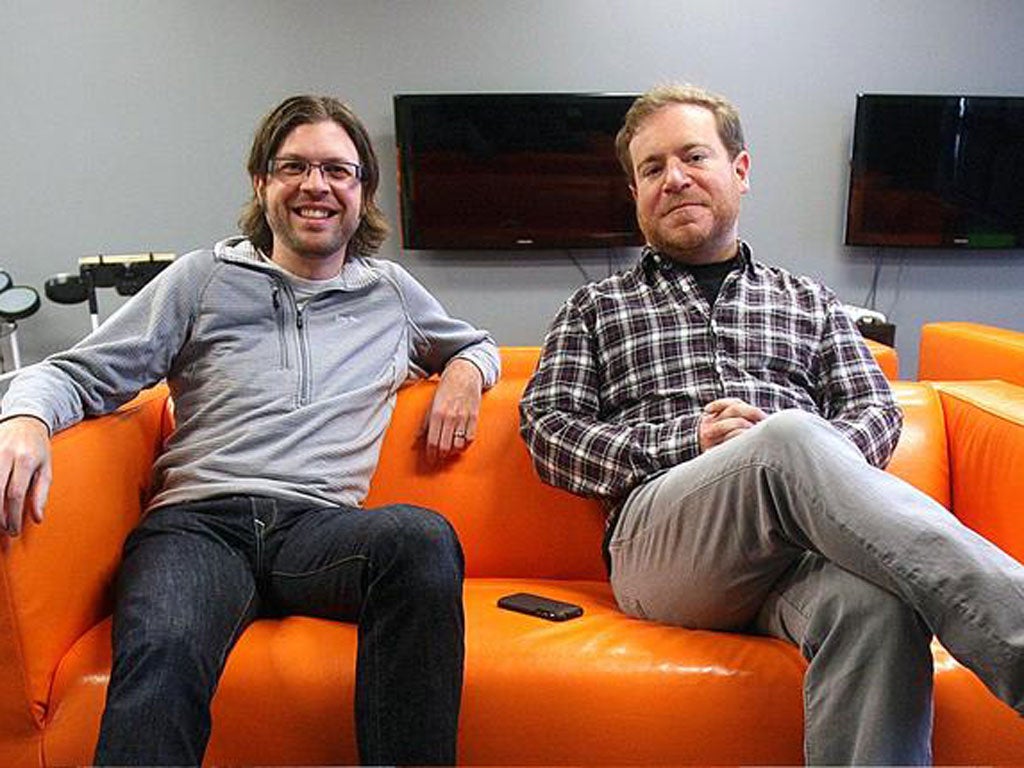Facebook v Google: The tech tug of war
Rivalry between Facebook and Google has led to a ferocious bidding war for the best brains in Silicon Valley. Simon Usborne reports on the geeks who are cashing in

When Kevin Rose starts work as the new boy on Monday morning, he will be showered with more perks than a millionaire geek could dream of. A valet will park his car, he will eat in a canteen whose chef is a veteran of some of California's best restaurants, and, if things get too stressful, he may visit one of four massage therapists. He will also reflect on his new bank balance as the latest winner in an increasingly fierce tug-of-war for the brightest talents in technology.
Rose, 35, was reported yesterday to have been hired by Google, whose headquarters are renowned for their generous facilities, after a bidding war with Facebook. The internet entrepreneur and founder of the social news website, Digg.com is ditching his start-up and taking his small team to the vast Googleplex. Each man will pocket an estimated one to two million dollars – and Rose stands to make much more as a new talent at the web's biggest company.
As unemployment in some US states climbs above 10 per cent, the giants of Silicon Valley are throwing increasing piles of cash at people like Rose. Google had not confirmed their new signing, and while speculation was rife that Rose had been drafted in to work on Google+, the company's troubled social network, it was not clear what he would be doing between gourmet lunches and hot stone treatments. But it is Rose's record that Google competed with Facebook for, and in the current technology arms race, talent has become an elusive prize.
"I've never seen things as white hot as they are at the moment," says Mike Butcher, the editor of TechCrunch Europe, a technology news blog. "Google isn't hiring Kevin Rose to sit in front of a computer and code programs. They're looking for the vision of the sort Mark Zuckerberg has. These people aren't just creating a product, they're creating something that people will want, whether or not they know it now."
Rose was raised in Las Vegas, where he dropped out of a computer science degree. In an interview in 2002, he said his most treasured possession was his sealed copy of Windows 1.0 ("no joke"). Obsession paid off and in 2004 he co-founded Digg, which allowed web users to like, or "digg" links online. The site first attracted Google in 2008, when a $200m buyout deal was on the table before collapsing. Rose left the company last year to found Milk, a mobile applications company.
The talents of people like Rose make them rare commodities. "Many people in the tech community are saying that what will limit the growth of tech companies over the next few years is not the technology, but the people," Butcher says. "There's a real shortage." The American Society for Training and Development has predicted that, by 2015, 60 per cent of new jobs will require specialist skills held by just 20 per cent of the population.
When talent emerges it's usually in the shape of a small start-up whose product acts as bait for the big fish. The real catch for them is the brains behind the company. There's an ugly neologism for the buying of companies to get to the people: You "acq-hire" them. At tech conventions across the world, competing companies and young entrepreneurs circle each other. "You get people going round with some of the most ridiculous iPhone apps hoping someone will think they are a genius and bring them on board," Butcher says. It's not like Roman Abramovich flying in a striker for a meeting on his private yacht, but the stakes can be as high, with winners receiving cash and share options worth millions.
"They call it the 'three Ts'," Butcher says. "Tech, team and traction. If you have those things you become a hot property and hope a CEO turns around and says, 'we've got an amazing offer'."
But the meat market that the tech world has become at events like SXSW is causing concern even among investors. Seth Levine, a tech investor based in Coloardo, blogged, before the Rose deal: "I'm worried that in all the hype... and the SXSW parties...we're losing sight of the hard work that is creating and building a business."
But Rose has also attracted criticism. His now-scrapped smartphone app, Oink, which he made with Milk, earned a respectable 150,000 downloads in its first month but was no sensation, and Digg hit troubled waters before he jumped ship. Google has been accused of throwing big money at a big-name signing rather than a player with something specific to bring to the team. What Rose will do for Google remains to be seen. Meanwhile, he can enjoy the perks.
$200m proposed buyout deal by Google for Digg.com in 2008, before it collapsed
April 2010 Mark Cummins and James Philbin, Plink. Sold to Google
August 2010 Rohit Khare, Angstro. Sold to Google
November 2011 Tristan Harris, Apture. Sold to Google
March 2012 Regina Dugan, Darpa. Hired by Google
March 2012 Kevin Rose, Milk. Hired by Google
December 2011 Scott Raymond and Josh Williams, Gowalla. Sold to Facebook for $3m in Facebook shares
October 2010 Sam Lessin, Drop.io. Sold to Facebook for a rumoured $10m
May 2010 Adam Wolff, ShareGrove. Sold to Facebook, price not disclosed
August 2009 Paul Buchheit, FriendFeed. Sold to Facebook for a reported $50m
April 2010 Sam Odio, Divvyshot. Sold to Facebook and Odio, price not disclosed
Join our commenting forum
Join thought-provoking conversations, follow other Independent readers and see their replies
Comments
Bookmark popover
Removed from bookmarks